
Edward Winter
From Chess: the Need for Sources:
As shown in Dimitrije Bjelica – A Unique Chess Writer, page 171 of Dimitrije Bjelica’s Wonderful world of chess quotes Mikhail Tal:
‘There are two kind of sacrifices – the corrects ones, and mine’s.’
Before being tossed into the Bjelica mangling machine, the Tal quote was something like:
‘There are two kinds of sacrifices – sound ones, and mine.’
We write ‘something like’ because other wordings can be found, such as ‘two types of sacrifice’, but the above version is what Anthony Saidy gave on page 303 of the June 1973 Chess Life & Review. However, he merely reported there that Tal ‘once said’ it.
Chess literature teems with things that players purportedly ‘once said’, ‘said on one occasion’, ‘used to say’, ‘liked to say’ and other vague variants, but what is the truth about the remark ascribed to Tal? When did he say, or write, such a thing, and in which language? When was it first recorded in print? What was the context? Did it relate to a specific game? What indication, if any, did Tal give that such a statement was made in jest (or, as anecdotalists like to say, ‘with a twinkle in his eye’)?
Later in the present article there is even an instance of ‘once upon a time’.
Hugh Myers (Davenport, IA, USA) has been reading American Chess Masters from Morphy to Fischer by Arthur Bisguier and Andrew Soltis (New York, 1974) and the following from the Preface, regarding Hermann Helms:
‘He played on the same Brooklyn Chess Club team as his good friend Harry Pillsbury and once defeated Frank Marshall twice in a New York State championship game.’
Our correspondent would like to know the Helms method for scoring two points from one tournament game.
(997)
From page 325 of The Golden Dozen by Irving Chernev (Oxford, 1976):
‘Eugene Alexandrovich Znosko-Borovsky (a resonant name if ever there was one) once published a monograph called “Capablanca’s Mistakes”. Capablanca’s response to this was to tell the author that he had tried to write a work called “Znosko-Borovsky’s Good Moves”, but had to give it up as he could not find enough material.’
(1562)
For many other fact-free versions of this story, see Chess Anecdotes.
Chess Trivia by Peter Hotton and Herbert A. Kenny (Boston, 1988) is a series of quizzes, two questions being shown below with our comment in brackets:
Page 3: ‘What master once stood on his head between moves in a match? Nimzovitsch.’
Page 21: ‘What master once stood on his head between moves in a tournament? Nimzovitsch.’ (So, once in a match and once in a tournament.)
(1821)
For the full C.N. item, see The Chess Chamber of Horrors.
From A Catastrophic Encyclopedia:
Divinsky thrives on rumours, and much of what he tells us is like gossip over backyard clothes-lines. Sentences begin with ‘Some say that ...’, ‘It is said that ...’, ‘He is said to have lost ...’, ‘Janowski is reputed to have said that ...’, etc.
On page 79 of Bobby Fischer’s Conquest of the World’s Chess Championship (New York, 1973) Reuben Fine wrote:
‘A German wit in fact once wrote a book entitled Instructions to Spectators at Chess Tournaments. The book consisted of three hundred blank pages and one other page on which was written: KEEP QUIET.’
(3099)
From page 24 of Bobby Fischer Goes to War by David Edmonds and John Eidinow (London, 2004):

At the start of an article entitled ‘The Mystery of the Chess Spectator’ on pages 80-83 of the 1/2016 New in Chess Mr Edmonds has rightly dispensed with the claim about a ‘book ... containing three hundred blank pages’:
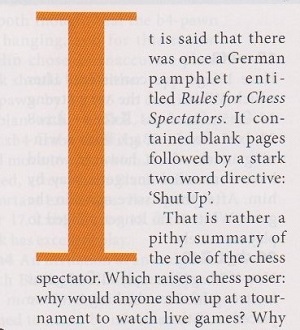
Another chess poser is why any writer would use the words ‘It is said that there was once ...’, and especially on a matter where the facts have been clearly established.
(9721)
In Historical Havoc we commented:
Mistakes and tittle-tattle have a gift for getting themselves duplicated that straightforward facts somehow lack.
From Rebuttals, concerning the BCM in 1989 (Editor: Bernard Cafferty):
In substantiation of the earlier criticism, our letter to Mr Cafferty listed further examples of the BCM’s defects. For instance, its love of speculation was demonstrated by this sample culled from a first reading of the April 1989 issue (which had arrived the same day as his letter):
‘According to one source, Portisch announced ...’ ‘Last year there was an unconfirmed report that he was told ...’ ‘One version runs that ...’ ‘Since the funds of the GMA are reported as quite low ...’ ‘One report speaks of the possibility that FIDE may be conceded ...’ ‘There is a persistent account in master circles that ...’ ‘A recent German source claimed there was a strong movement ...’ ‘It is also said that the Polgars have ...’
Our question to Mr Cafferty was:
Will future historians consider the BCM a worthwhile reference source when you publish so much of that sort of thing?
Anyone wishing to make chess history ‘fun’ by spreading unsubstantiated anecdotes and tittle-tattle has only to eschew specifics like dates and places and rely on the shadowy word ‘once’. From 2010 Chess Oddities by A. Dunne (Davenport, 2003) we scoop up the following selection:
‘World Champion Emanuel Lasker was once offered an opium scented cigar …’
‘Aron Nimzovich once broke his leg ...’
‘Aron Nimzovich once stood on his head ...’
‘Pal Benko once thought Mikhail Tal was trying ...’
‘Max Euwe once requested a game for the World Championship be postponed ...’
‘Akiba Rubinstein once won four brilliancy prizes in one tournament.’
‘Anatoly Karpov once listed his hobbies as ...’
‘Mikhail Tal was once signed to play the Devil in a movie ...’
‘Tal was once asked what chess piece he would like to be ...’
(3112)
Brief extracts from C.N. 3195 (see Chess with Violence):
Harold C. Schonberg on page 96 of Grandmasters of Chess (Philadelphia and New York, 1973):
‘When enraged he [Steinitz] became subhuman. During the Paris Tournament of 1867, in a trifling dispute, he spat on his opponent, a British player – some say it was Blackburne – who promptly knocked his head through the window.’
Schonberg’s book was discussed, by no means respectfully, in CHESS in 1974-75, and on page 104 of the January 1975 issue Wolfgang Heidenfeld quoted the above passage and commented:
‘This may, or may not, be true. But in order to lend substance to a thin story which might otherwise be disbelieved, the author inserts his comment “some say it was Blackburne”. This makes it interesting – or does it? Bad luck, chum: Blackburne did not even play in Paris, 1867.’
When Schonberg’s Grandmasters of Chess appeared in paperback (see page 80 of the 1975 Fontana edition), Paris was out, London was in, and that other faithful stand-by word, ‘once’, was enlisted:
‘When enraged he became subhuman. Once, playing at a London club, he got into a dispute with a British player – some say it was Blackburne – and spat on him, promptly getting his head knocked through the window.’
In the ‘revised and updated’ edition of Schonberg’s book, published in New York in 1981, the passage (see page 96) turned out to be a hybrid version, with Buckley’s word ‘subhuman’ also gone:
‘When enraged he lost control. Once, in a London club, he got into a dispute and spat on his opponent, a British player – some say it was Blackburne – who promptly knocked his head through the window.’
Page 113 of The World of Chess by A. Saidy and N. Lessing (New York, 1974) contained another ‘is-said-to-have’ version, although with the adjective ‘enraged’ applied to Blackburne, not Steinitz:
‘In 1870 [sic – 1876 would be correct] he trounced Blackburne, 7 to 0. The British master, who was fond of the bottle, is said to have become so enraged at one point that he threw Steinitz out of a window.’
As shown in The Chess Chamber of Horrors, which reproduced C.N. 557, page 126 of Chess for Tomorrow’s Champions by J.N. Walker (Oxford, 1983) affirmed:
‘It is said that Blackburne once became so angered at being mowed down 7-0 by the little Austrian [Steinitz] that he picked him up and chucked him out of the window.’
C.N. 3196 concluded:
Another article by Hans Kmoch and Fred Reinfeld in the 1950 Chess Review (February issue, page 55) said that at the end of his game against Grünfeld at Vienna, 1922 ‘Alekhine resigned – by taking his king and throwing it across the room’. Kmoch was a participant in the tournament.
Such accounts are insufficiently vivid for the likes of Harold C. Schonberg, who decided, on page 27 of Grandmasters of Chess, to make the throwing more dramatic and the destroying more frequent:
‘Alekhine once resigned, frantic with rage and frustration, by picking up his king and hurling it across the room, nearly braining a referee in the process. (Tournament pieces are weighted with lead; they can be dangerous weapons.) Alekhine would also relieve himself after a loss by going to his hotel room and destroying the furniture.’
In Grandmasters of Chess Schonberg exhibited scant concern for facts or fairness, and on page 220 he even professed that Alekhine was ‘as amoral as Richard Wagner or Jack the Ripper’. If morality is the issue, Schonberg’s act of writing such a thing is worth a moment’s contemplation.
As shown in Alexander Alekhine Miscellanea, page 222 of The Sports Hall of Shame by Bruce Nash and Allan Zullo (New York, 1987) had a spiced-up version of Schonberg’s story:
‘Once, after he was forced to surrender in a major tournament, a raging Alekhine grabbed his lead-weighted king and hurled it like a bean-ball across the room, nearly braining a referee who ducked just in time.’
From the article ‘Unconventional Surrender’ by Kmoch and Reinfeld on page 55 of the Chess Review, February 1950:
‘Alekhine hit on still another way of resigning during the Vienna tournament of 1922. ... When he saw that Grünfeld had sealed 54...Q-B6 (the strongest move), Alekhine resigned – by taking his king and throwing it across the room.’
From page 4 of Why You Lose at Chess by Fred Reinfeld (New York, 1956):
‘Hans Kmoch and I once surveyed [methods of resigning] in an article called “Unconventional Surrender”. We recalled that Alekhine, who was unequaled as a desperate fighter in disheartening situations, occasionally [our emphasis] resigned by picking up his king and hurling it across the room.’
Notwithstanding the word ‘occasionally’, the Kmoch/Reinfeld article had not suggested that the conclusion of the Alekhine v Grünfeld game was other than an isolated incident.
As noted above, Kmoch was a participant in Vienna, 1922, but does any other source corroborate the claim about Alekhine which Kmoch made nearly three decades later?
(5843)
The above C.N. item was entitled ‘The anecdotalist’s plural’.
From page 67 of Idle Passion by Alexander Cockburn (New York, 1974), regarding Alekhine:
‘He would sometimes hurl his king across the room. On occasion he would smash the furniture. Games generated an enormous tension in him.’
A further illustration of the ‘once’ school of narrative comes from page 24 of Curious Chess Facts by I. Chernev (New York, 1937):
‘Steinitz was once arrested as a spy. Police authorities assumed that the moves made by Steinitz in playing his correspondence games with Chigorin were part of a code by means of which important war secrets could be communicated.’
The identical paragraph appeared on page 31 of Chernev’s Wonders and Curiosities of Chess (New York, 1974), whereas on page 89 of The Fireside Book of Chess by I. Chernev and F. Reinfeld (New York, 1949) the wording was slightly different:
‘Steinitz was once misjudged to be a spy. Police authorities assumed that the moves made by him in playing his correspondence games with Chigorin were part of a code by means of which important war secrets could be transmitted.’
For the remainder of this item (C.N. 3345) see Chess Anecdotes.
From page 134 of How to Play Winning Chess by Fred Reinfeld (New York, 1962):
‘On one occasion during an important tournament Dr Vidmar playfully placed his cigar case, full of cigars, on the playing table. Though Vidmar showed no sign of wanting to smoke, Nimzowitsch was greatly agitated. Finally, unable to control himself any longer, he ran off to the tournament director with his complaint.
Trying to soothe him, the tournament director pointed out that Vidmar was not actually smoking. “Yes, that’s true”, Nimzowitsch answered, “but he might. And you know that in chess, the threat is stronger than the fulfillment”.’
As shown in A Nimzowitsch Story, C.N. 8818 gave a ‘once’ version, from page 200 of a book by W. Ritson Morry and W. Melville Mitchell:
‘Dr Vidmar once promised to refrain from smoking in a game with Nimzowitsch, but in mid-session the latter approached the controller very agitatedly saying “You remember Vidmar promised not to smoke?” “Yes”, replied the controller. “But he isn’t.” “Ah”, came the reply, “but he looks as if he wants to, and you know that Capablanca said a threat is stronger than its execution.”’
From page 149 of How to Play Chess Like a Champion by F. Reinfeld (New York, 1956):
‘Staunton was pompous and bombastic, a self-appointed dictator of the chess world. On one occasion a rival published a statement that he had won the majority of his games with Staunton. The next time they met Staunton thundered, “You can’t print that!” His rival stammered feebly that the statement was true. “What’s that got to do with it? Of course it’s true!”, Staunton raged. “But you still can’t print it!”’
In C.N. 1624 (see pages 132-134 of Chess Explorations) we quoted Chernev’s version of the anecdote in The Bright Side of Chess, as well as a (significantly different) account by G.A. MacDonnell in the Illustrated Sporting and Dramatic News. In both cases Staunton’s rival was named as Löwenthal. Do any other nineteenth-century sources discuss the alleged episode?
(4030)
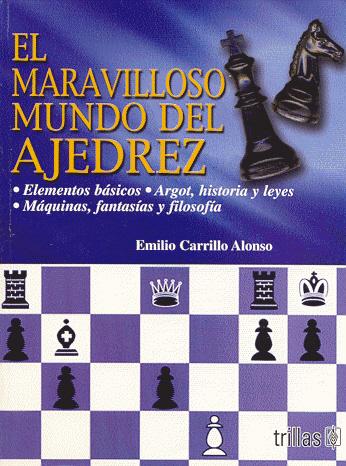
Owing to a printing fault in our copy of El maravilloso mundo del ajedrez by Emilio Carrillo Alonso (Mexico City, 2002) quite a few pages are blank. It is a pity that those which are not are not. Pages 157-160, for instance, might profitably have been an ink-free zone, but instead the author annotates games purportedly played by Stalin and Einstein, both of them headed ‘Moscow, 1926’. (See Alleged Games by Einstein and Stalin.)
On page 67 he unhelpfully and without further particulars attributes the ‘pity’ quote (C.N. 3949) to ‘León Tolstoi (1883-1945)’, although those are the dates of Alexei Tolstoy. Page 77 could readily have gone too. Without corroboration it ascribes to Rubinstein the remark about learning from Anderssen how to make combinations and from Tarrasch how to avoid making them. (That quote is commonly attributed to Spielmann, but what is the exact original source?) On the same page Alonso shows himself a disciple of the ‘once’ school of anecdotage, the equally casual Spanish equivalent of ‘once’ being ‘en alguna ocasión’. Thus we learn that Marshall ‘once’ said of Capablanca, ‘Anyone who has beaten me in a contest is inevitably a great player.’ (‘En alguna ocasión afirmó de Capablanca: “Quien me ha ganado a mí en un encuentro es por fuerza un gran jugador”’.
C.N. 3574 asked which Mendelssohn declared that ‘chess is too much of a game to be a science and too much of a science to be a game’. That open question is complicated further on page 66, where Alonso claims that the remark was made, ‘en alguna ocasión’, by Gottfried Leibniz:
‘G.W. Leibniz (1646-1719), filósofo y matemático alemán, dijo en alguna ocasión: “El ajedrez es demasiado juego para ser una ciencia y demasiada ciencia para ser un juego”.’
Alonso is three years out with Leibniz’s year of death, but is he necessarily wrong about the rest? After all, can anyone hope to prove decisively whether or not such a ‘once’ quote is correct? The same may apply to an observation sourcelessly attributed to Salo Landau on page 76: ‘El ajedrez es como una droga: beneficioso en pequeñas dosis, fatal en dosis frecuentes.’ (Chess is like a drug: beneficial in small doses, fatal in frequent doses.’)
(4133)
Below is an extract from an article, if it merits that term, by George Koltanowski entitled ‘Koltanowski, as usual!’ on page 412 of CHESS, 14 July 1936:
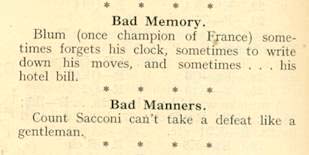
Koltanowski gave no substantiation for his attack on Sacconi, any more than he backed up his assault on the mysterious ‘Blum (once champion of France)’.
(4191)
The following paragraph appeared on page 248 of Lasker’s Chess Magazine, April 1905:
‘The Cheltenham Chronicle is authority for the remark that once upon a time Blackburne was playing a simultaneous series in one of the English chess clubs and upon his opponent replying to his P-K4 with P-K3 he tried to be facetious and said, “Ha, I resign”. The player promptly replied, “Thank you, Mr Blackburne, I accept. Mr Secretary, will you kindly score a win for me.” And the game was so scored.’
We recall that an earlier version of the yarn was different. From page 232 of the May 1891 BCM, in an article on Purssells, London (‘one of the greatest chess rooms in the world’):
‘Blackburne was once playing here with a very irascible old gentleman, who was most particular in enforcing all rules of the game and, when in a certain humour, could not take a joke. It was his own first move, and he played P-K3. “Ah”, said Blackburne, “now I resign.” “All right”, said his touchy opponent, “that’s one game to me”, and nothing, as Blackburne knew, would alter that determination, so it was duly scored. This is the shortest game on record. Blackburne was beaten in one move.’
(4963)
C.N. 3195 (see Chess with Violence) commented that ‘promptly’ is a favourite word of the anecdotally inclined.
C.N. 9582 showed how Dawid Janowsky was derided on page 95 of B.J. Horton’s Dictionary of Modern Chess (New York, 1959). Another example, anchored in tittle-tattle, comes from pages 99-100 of The World’s Great Chess Games by Reuben Fine (New York, 1951) [and includes the words ‘Once, the story goes ...’]:
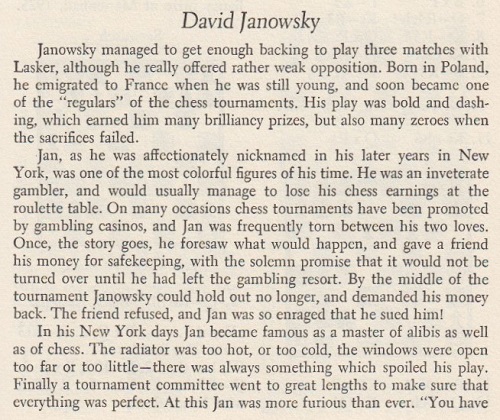

The famous game published by Fine was against ‘Schallop’ (sic) at Nuremberg, 1896.
(9655)
See Janowsky Jottings.
The weakest field in all chess literature is surely quotes. Innumerable carefree outlets cite alleged remarks, without any attempt to supply even a vague source, let alone proof of authenticity. Whole books have been written along such lines, and no good volume of chess quotes has yet appeared in any language. Unimpressive websites may have a source-free ‘quote of the day’ or, even, long lists of purported remarks by luminaries, and others, all without substantiation. Writers fall back on know-nothing/tell-nothing introductions such as ‘Botvinnik is quoted as saying ...’, ‘As Tartakower once wrote ...’, ‘I read somewhere that Steinitz claimed ...’, ‘Wasn’t it Alekhine who remarked ...?’, ‘I’ve heard that Tarrasch often observed ...’, ‘Sources I’ve seen say that Lasker stated ...’ and ‘It is widely reported that Fischer said ...’ In short, the whole domain, reflecting an excess of name-dropping and a deficit of rigour, is a shambles.
(5825)
From page 22 of Relax with Chess by Fred Reinfeld (New York, 1948):
‘It was that exuberant phrase-maker and paradox-monger Dr Tartakower who once remarked that a pawn sacrifice requires more skill than does a queen sacrifice. The reason? Sacrificing the queen calls for exact calculation of a quick finish. The pawn sacrifice, on the other hand, involves an intuitive flair possessed as a rule only by the great masters.’
Where did Tartakower make such a remark?
(6104)
See also C.N. 9859.
From page 4 of Relax with Chess by Fred Reinfeld (New York, 1948):
‘The story goes that a practical joker, taking advantage of Akiba Rubinstein’s predilection for 1 P-Q4, once nailed down the grandmaster’s queen’s pawn.’
(6113)
A number of C.N. items have discussed instances of lengthy reflection (or, at least, lengthy consumption of time) before a move has been played. A famous case from the nineteenth century was examined in C.N. 4680, which reported that under the heading ‘Amazing facts’ the following had appeared on page 17 of Playing Chess Step-by-Step by Gary Lane (New York, 2004):
‘The slowest chessplayer ever was Louis Paulsen, who once thought for 11 hours over one move.’
This ‘fact’ of the ‘once’ variety would appear to be based on a misunderstanding. The figure of 11 hours was given, regarding the New York, 1857 tournament, on page 67 of Paul Morphy The Pride and Sorrow of Chess by David Lawson (New York, 1976) but in a different context:
‘Undoubtedly, slow playing on the part of Paulsen was the reason for time records being kept during his games with Morphy. Moves over five minutes during the second game and portions of others were recorded. During the entire second game, Morphy’s total time for moves over five minutes was only 25 minutes, while Paulsen consumed 11 hours for the same.’
The above comes from Chess and Time. See also Paulsen v Morphy, New York, 1857.
A quote from page 26 of Evans on Chess by Larry Evans (New York, 1974):
‘... Richard Reti, who in 1919 startled the chessworld by announcing that “White’s game is in its last throes” after 1 P-K4.’
(6264)
From page 88 of Chess Beginner to Expert by Larry Evans (Wellesley Hills, 1967):
‘Breyer once began annotating a game by: “1 P-K4?” His terse comment, “White’s game is in its last throes!”’
See Breyer and the Last Throes.
‘Tarrasch once observed that if one piece stands badly, all the pieces stand badly.’
Source: Planning by Neil McDonald (London, 1995), page 19.
As in the case of the ‘Tarrasch and the gods’ quote (C.N. 6218), more than one source can be provided for such a remark:
Those wordings (with ‘often’ and ‘usually’) are not as categorical as the McDonald version, but there may well be further occurrences of a similar observation elsewhere in Tarrasch’s writings.
(6284)
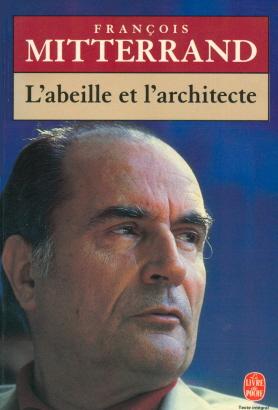
C.N. 2391 remarked that the opening paragraph of L’abeille et l’architecte by François Mitterrand (Paris, 1978) discussed chess:
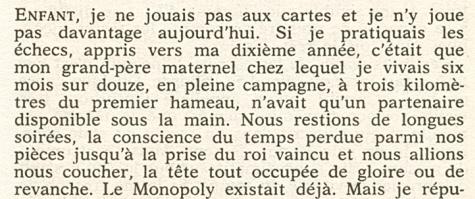
Our earlier item (see page 390 of A Chess Omnibus) gave an English translation.
Other chess references concerning Mitterrand will be welcome. We note this ‘einmal’ quote (with a misspelling of the President’s name) on page 216 of Persönlichkeiten und das Schachspiel by B. Rüegsegger (Huttwil, 2000):
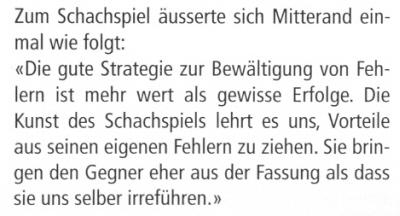
(6594)
For another example of einmal, see C.N. 11414 (Alekhine and languages).
Wanted: substantiation of this ‘once’ quotation:
‘Alekhine once said, “There must be no reasoning from past moves, only from the present position”.’
Source: The Golden Dozen by Irving Chernev (Oxford, 1976), page 260.
(6704)
See too the follow-up C.N. items 6720 and 7232.
On page 137 of the July 1955 Chess World C.J.S. Purdy wrote:
‘Kostić once said chess was 90% tactics, and he was right – not necessarily in the precise figure but in the general idea it conveys.’
See Chess Strategy and Tactics.
Our Purdy feature article also discussed this remark by him on page 225 of Chess World, October 1951:
‘Ahues once took his own pawn in a big tourney’.
From page 306 of The Book of Games by Jack Botermans (New York, 2008), and yet another instance of what might be termed oncery, oncing or oncitis:
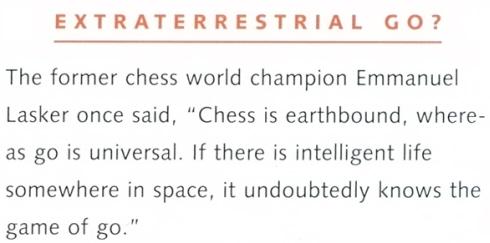
Similar, though not identical, sentiments were attributed to Lasker on pages 253-254 of a book which needs to be treated circumspectly: Emanuel Lasker Biographie eines Schachweltmeisters by J. Hannak (Berlin-Frohnau, 1952):


The passage was quoted from Hannak’s book on page 384 of Emanuel Lasker: Denker Weltenbürger Schachweltmeister edited by R. Forster, S. Hansen and M. Negele (Berlin, 2009). It did not, though, appear in the relevant section (on page 265) of the English-language edition of Hannak’s book (London, 1959).
Can further details about the quote be found?
(6817)
Writers (including those individuals who incongruously combine pseudonymity with self-importance in forum discussions) chew over the rights and wrongs of the case, without knowing the facts or even whether there is a case. We are informed what they feel perhaps happened, what their best guess would be, what they would not be surprised by, what they think they once read somewhere, and what they deem a fitting punishment in view of what they ‘reckon’ occurred. If much of the discussion (dressed up, where possible, as ‘breaking news’) is expressed in prose dashed off without concern for spelling, grammar or anything else, that is a small price to pay for immediacy and the common goal of making the affair ‘go viral’. All the writers can then feel that they have been in on something worthwhile and have done their bit within the chess community.
(8151)
Page 54 of the May-June 1937 American Chess Bulletin quoted an item from the South African Chess Magazine:
‘It is said a wealthy chess enthusiast left his son £1,000 a year on condition the lad never took the QKt pawn. The game (Botvinnik v Spielmann) once more serves to show how extremely wise the old gentleman was.’
(8289)
From page 7 of Modern Master-Play by F.D. Yates and W. Winter (London, 1929):
‘A story is told of a chess enthusiast of the middle of the last century who willed his son £1,000 per annum on condition that he never took the QKtP ...’
(8955)
Extreme scepticism is naturally de rigueur with anything introduced by ‘It is said ...’ or ‘A story is told ...’
See The Poisoned Pawn in Chess.
Things That Matter by Charles Krauthammer (New York, 2013) has three brief chess articles, on pages 55-57, 102-104 and 108-111, but the only thing that apparently matters to him about the great masters of the past is using their lives as fodder for ‘fun’.
Page 104 (in an article reproduced from Time, 19 November 1990) has this remark, with the almost mandatory ‘once’:
‘The great Steinitz, who once claimed to have played against God and won (he neglected to leave a record of the game), went quite mad.’
There is nothing else about Steinitz, and the short paragraph moves on seamlessly to three or four lines about Fischer (dental fillings and the KGB).
(8461)
See Steinitz versus God and ‘Fun’.
‘Alekhine was once quoted as saying that the successful tournament player must combine the chief characteristics of a research scientist, an ascetic monk and a beast of prey.’
Source: page 8 of Blunders and Brilliancies by Ian Mullen and Moe Moss (Oxford, 1990).
‘Alexander Alekhine was once quoted as saying, in summing up the situation, that the successful tournament player “must combine the chief characteristics of a research scientist, an ascetic monk and a beast of prey”.’
Source: page 139 of Counterplay by Robert Desjarlais (Berkeley and Los Angeles, 2011). An endnote on page 233 merely mentioned as the source the 1990 Mullen/Moss book.
(8958)
For other versions of this alleged quote, see Chess: the Need for Sources.
From page 5 of Chess to Enjoy by A. Soltis (New York, 1978):
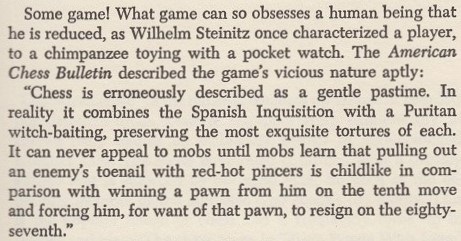
The Steinitz ‘once’ story was disposed of in C.N.s 1077 and 6590.
As regards the paragraph quoted, Soltis did not bother to state when during its long run (1904-63) the American Chess Bulletin published it.
(9138)
The answer is that the passage appeared on page 25 of the February 1935 American Chess Bulletin but was specifically headed as a feature merely reproduced from elsewhere (‘New York “Sun” Editorial’).
C.N. 7702 (see too Memory Feats of Chess Masters) showed an extract from pages 106-107 of The Fireside Book of Chess by I. Chernev and F. Reinfeld (New York, 1949):


The same C.N. item quoted another ‘once’ version, by Frank Rhoden on page 66 of the February 1971 Chess Life & Review:
Pillsbury ‘... was once tested by a psychologist ...’
Now, we add the following from page 354 of Chess Words of Wisdom by Mike Henebry (Victorville, 2010):
‘He once memorized 30 difficult, unusual and large words that were read to him only once. He read them backwards and forwards without error and even remembered them the next day.’
However, in that passage the ‘he’ was not Pillsbury, but Blackburne.
Earlier in the same paragraph, Mr Henebry had a sentence about Blackburne which began:
‘He was once showed ...’
On the next page, still in the Blackburne section:
‘Once, playing blindfold, he announced ...’
The following paragraph was a quote from a Santasiere/Smith book. It began:
‘Once when Blackburne was giving a simultaneous exhibition ...’
After Blackburne there was a section on Steinitz, with more of the same. From page 359:
‘A story goes that once, he was arrested as a spy!’
(10515)
C.N. 10515 gave some ‘once’ quotes from Chess Words of Wisdom by Mike Henebry (Victorville, 2010), and one more will suffice for now, from page 371:
‘Rueben [sic] Fine once said, “What others could not see in a month’s study, he saw at a glance” (Capablanca’s Best Chess Endings, Irving Chernev).’
Why mention Chernev when Fine’s famous remark is easily found on page 111 of his book The World’s Great Chess Games (New York, 1951 and London, 1952)?
Fine had originally published his words on page 288 of Chess Review, October 1943:

It will be noted that Fine consistently wrote ‘What others could not discover’, and not ‘see’, which was Chernev’s small misquotation in Capablanca’s Best Chess Endings, Combinations The Heart of Chess and The Golden Dozen. Chernev put ‘discover’ in Wonders and Curiosities of Chess. The respective page numbers in these four Chernev books are 60, 227, 279 and 55.
When Cyrus Lakdawala gave the Fine sentence, sourcelessly, on page 7 of his book on Capablanca (C.N. 7742), the verb was ‘find’.
Finally, there is the individual who took Fine’s words and presented them as his own:
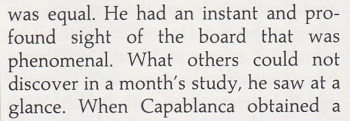
Source: page 37 of The Batsford Chess Encyclopedia by Nathan Divinsky (London, 1990).
(10540)
Information is requested about this assertion on page 247 of Chess Words of Wisdom by Mike Henebry:
‘As Réti once said, “One should be wary of easily understandable moves”.’
(10560)
Page 39 of Winning Chess Tournaments by Robert M. Snyder (Lincoln, 2007) had another variation:
‘I once heard a story where a reporter asked the famous master Jose Capablanca, “How many moves do you see ahead?” He jokingly said, “Fifty!” The reporter, not knowing much about chess, wrote that down in his notes and then proceeded to ask another famous master, Richard Réti, the same question. Réti said, “One! But always the right one.” There is something to be learned from this: You only need to see as deep as necessary to establish the best move for the position.’
(10014)
From C.N. 2664:
As ever, the call is for solid information. This is not the place for observations along the lines of ‘If memory serves, my understanding has always been that I read somewhere that maybe there was talk once of a rumour that someone perhaps mentioned an oral tradition that it may possibly have been claimed that it was widely believed that …’
A further remark, in C.N. 4474:
... other precursors of nescience include, ‘My best guess would be that ...’, ‘If I had to guess I would say that ...’, ‘I think I read or heard somewhere that ...’ and ‘The last I heard was that ...’
Other phrases not recommended:
‘It’s a fair bet that ...’ and ‘From what I understand ...’
A comment by us in Chess and the English Language:
A handily vague term for chroniclers devoid of hard facts is ‘by all accounts’, along with its meeker sibling ‘by most accounts’.
From The Termination:
The matter is simply too important to be touched by the ‘I-think-I-read-somewhere’ and ‘My-guess-would-be’ brigade.
From page 41 of the London, 2007 edition of Kasparov’s How Life Imitates Chess:
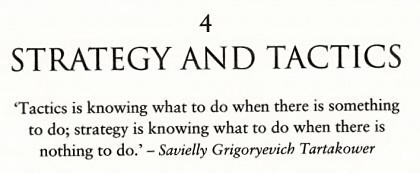
In the US edition (New York, 2007) this ‘Tartakower quote’ is in the heading to Chapter 3, on page 36. But did Tartakower make such a remark and, if so, where and when?
The earliest citation that we can currently offer is nothing better than a ‘once’ reference in an article about Fischer by Harold C. Schonberg on page SM63 of the New York Times, 23 February 1958:
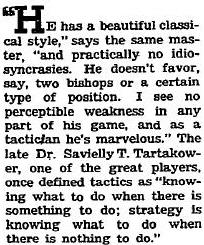
The article was reproduced on pages 49-55 of The Joys of Chess by Fred Reinfeld (New York, 1961), still with the initial T. for Tartakower’s second forename. Schonberg also ascribed the quote to Tartakower on page 160 of Grandmasters of Chess (Philadelphia and New York, 1972), and it is regularly seen in chess books, without a source. For instance, Gary Lane used it to fill a corner on page 57 of Prepare to Attack (London, 2010).
In his entry on aphorisms on page 16 of The Encyclopedia of Chess by Harry Golombek (London, 1977) Wolfgang Heidenfeld included the following:
‘“Whereas the tactician knows what to do when there is something to do, it requires the strategist to know what to do when there is nothing to do” (Abrahams).’
Heidenfeld gave no source, but we have found the remark on page 150 of Abrahams’ book Teach Yourself Chess (London, 1948), although with ‘strategian’ instead of ‘strategist’.
Furthermore, the following can be quoted from page 152 of The Handbook of Chess by Gerald Abrahams (London, 1965):
‘At many stages of the game the general choice is available; what to do now that there is no coercion? Epigrammatically, it may be said: Tactics are what you do when there is something to do. Strategy is what you do when there is nothing to do. That isolation, however, is rare. Strategy is a feature, albeit unobserved, of most good tactical play. It is latent – not patent.’
(8833)
Further details are given in Chess Strategy and Tactics.
Regarding rumour, gossip and speculation, we have noted before the prevalence of comments along the lines of ‘I think I read somewhere someone reckons Carlson would of beat Fisher’. A milder example from page 197 of the Chess Player’s Chronicle, February 1875:
‘It was stated somewhere or other the other day that Miss Rudge might probably play a match with the Championess of the United States.’
(10799)
With terms like ‘is reported to have said’ (and ‘reportedly said’), the floodgates are open for anyone to write anything.
(11998)
Prompted by the swirl of unverified and unverifiable claims about online cheating, we suggest the following:
Accusations need corroboration. Insinuations need expurgation.
(12007)
This ‘William Hickey’ column on page 4 of the Daily Express, 9 January 1935 has been forwarded by Jonathan Manley (Oxford, England), who is currently co-writing a book on Sir George Thomas with Tibor Károlyi:
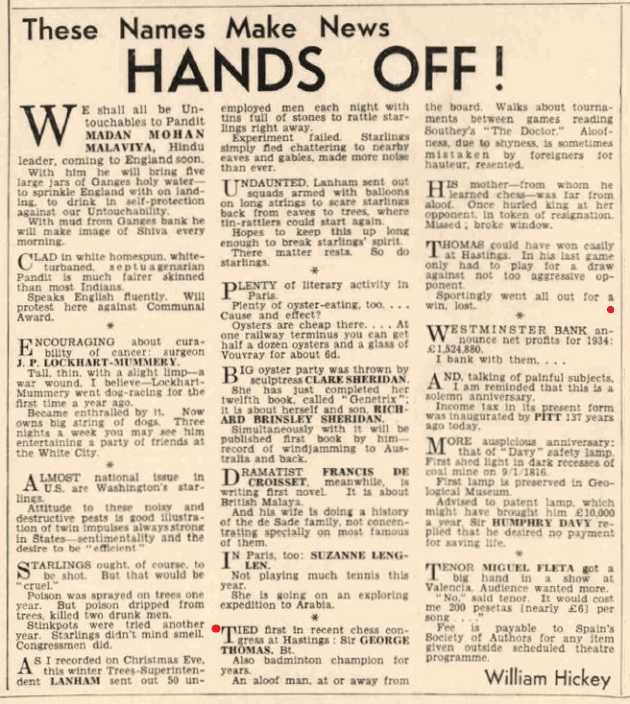
We hardly dare ask whether corroboration exists for the assertion that Lady Thomas ‘once hurled king at her opponent’ but, for form’s sake, the column is being added to Chess with Violence and ‘Once’.
Mr Manley notes that the ‘William Hickey’ column at the time was conducted by Tom Driberg (1905-76).
(12179)
To the Archives
for other feature articles.
Copyright Edward Winter. All rights reserved.